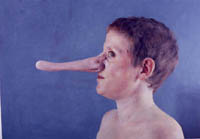Everyone lies to save their lives and keep their secrets in disguise
Everyone lies. It may only be “white” lies, but everyone tells lies or “omits the truth” sometimes.

People start lying at around age 4 to 5 when children gain an awareness of the use and power of language. This first lying is not malicious, but rather to find out, or test, what can manipulated in a child’s environment. Eventually children begin to use lying to get out of trouble or get something they want.
White lies, those concocted to protect someone’s feelings, are not a big deal at all. The person, however, who seems to feel compelled to lie about both the small and large stuff has a problem.
We often call these folks pathological liars. They lie to protect themselves, look good, gain financially or socially and avoid punishment. Quite often the person who has been deceived knows that this type of liar has to a certain extent deluded him or herself and is therefore to be somewhat pitied.
A much more troubling group is those who lie a lot - and knowingly - for personal gain. These people may have a diagnosis called antisocial personality disorder, also known as being a sociopath, and often get into scrapes with the law.
Lying often gets worse with the passage of time. When you get away with a lie it often impels you to continue your deceptions. Also, liars often find themselves perpetrating more untruths to cover themselves, according to MSNBC.
Many animals engage in deception, or deliberately misleading another, but only humans are wired to deceive both themselves and others, researchers say. People are so engaged in managing how others perceive them that they are often unable to separate truth from fiction in their own minds, says University of Massachusetts psychologist Robert Feldman.
For instance, in one experiment, Feldman put two strangers in a room together. They were videotaped while they conversed. Later, independently, each was asked to view the tape and identify anything they had said that was not entirely accurate.
Rather than defining what counts as a lie and to avoid the moral tone of the word "lie," Feldman's experimenters simply asked subjects after the fact to identify anything they had said in the video that was "not entirely accurate."
Initially, "Each subject said, 'Oh, I was entirely accurate,'" Feldman told LiveScience. Upon watching themselves on video, subjects were genuinely surprised to discover they had said something inaccurate. The lies ranged from pretending to like someone they actually disliked to falsely claiming to be the star of a rock band.
The study, published in the Journal of Basic and Applied Psychology, found that 60 percent of people had lied at least once during the 10-minute conversation, saying an average of 2.92 inaccurate things.
Men lie no more than women, but they tend to lie to make themselves look better, whilewomen are more likelyto lie to make theotherperson feel better.
Extroverts tend to lie more than introverts, Feldman found in similar research involving a job-interview situation.
Other research has delved into prevarication in the workplace. Self-esteem and threats to our sense of self are also drivers when it comes to lying to co-workers, rather than strangers, says Jennifer Argo of the University of Alberta.
A recent study she co-authored showed that people are even more willing to lie to coworkers than they are to strangers.
"We want to both look good when we are in the company of others (especially people we care about), and we want to protect our self-worth," Argo told LiveScience.
The experiment involved reading a scenario to a subject, telling them they had paid more than a coworker for the same new car. When the coworker, in the scenario, mentioned what they had paid, $200 or $2,000 more in different versions of the experiment, the subject was asked to report how they would respond.
Argo found that her subjects were more willing to lie when the price difference was small and when they were talking to a coworker rather than to a stranger.
Consumers lie to protect their public and private selves, she wrote in the Journal of Consumer Research with her colleagues from the University of Calgary and University of British Columbia .
Argo said she was surprised that people are so willing to lie to someone they know even over a small price discrepancy.
How, then, can we best detect whether we are being misled? There is no foolproof way, but there are often clues you can see in behavior that should make you suspicious:
- Avoidance of eye contact: Usually someone makes eye contact at least half the time they are talking to you. If you notice them avoiding eye contact or looking down during a specific part of a conversation, they may well be lying.
- Change of voice: A variation in pitch of voice or rate of speech can be a sign of lying. So can lots of umms and ahhs.
- Body language. Turning your body away, covering your face or mouth, a lot of fidgeting of hands or legs can indicate deception.
- Contradicting yourself. Making statements that just don’t hold together should make you suspicious.
If you lie all the time, even about unimportant things, you are likely to have a problem that will eventually - if it hasn’t already - cause you real relationship, financial or legal troubles. Figuring out what is driving you to lie in the first place will help heal this self-destructive behavior. This may mean going into treatment with a therapist to discover why you feel the need to deceive, say MSNBC experts.
Sources: agencies
Prepared by Alexander Timoshik
Pravda.ru
Subscribe to Pravda.Ru Telegram channel, Facebook, RSS!





